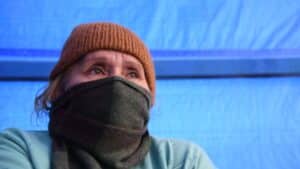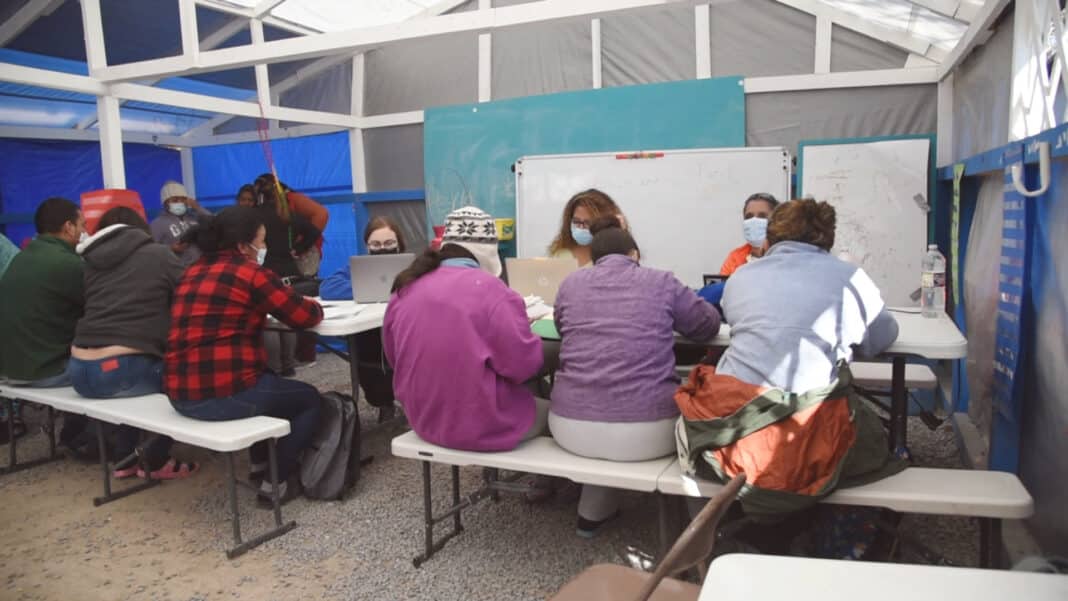An online platform meant to usher the end of a nearly two-year struggle for migrants in Matamoros forced to remain in Mexico while they await their U.S. court hearing was fraught Friday, the day it rolled out, with challenges ranging from weak internet reception, to an inundation of web traffic, and unaccommodated disabilities.

(Monitor photo)
“There were a lot of failed attempts,” Daniel, a Venezuelan migrant in Matamoros under the Migrant Protection Protocols, or MPP, said. “I tried about 30 times on a single day.”
The United Nations High Commissioner for Refugees created the website to register migrants who qualify to be reprocessed in the United States. Migrants are expected to input data from their court documents into the four-page online platform, but confusion set in just as quickly as the website went live on Friday afternoon.
Non-governmental groups at the camp were told the website would go live around noon. Migrants refreshed the page, conecta.acnur.org, multiple times. A few minutes later, the page started to function, but many didn’t know what to expect.
A small group formed and headed to the north part of the camp where tents — part of a staging area where migrants will be tested for the coronavirus 24 hours before they are reprocessed in the U.S. — were under construction and overseen by UNHCR staff. A group of about a dozen migrants asked a representative for questions, but he told them he couldn’t provide specific information.
Some moved around the camp, waving their phones around, hoping to catch a strong cell reception. Others moved in search of answers from anyone in a position to offer them.
An attorney who regularly provides legal assistance to migrants, Charlene D’Cruz, was bombarded with questions after showing up to assist with other legal issues around noon. She decided to host an impromptu guidance session inside a small building in the camp used to educate children.
Crowds gathered quickly as word spread the attorney was present. D’Cruz was visibly overwhelmed while trying to set up her hot spot while frustration mounted, overlapping questions grew louder, and more people began lining up outside the education center. A volunteer began letting them in 10 people at a time.
“They just accepted my appeal about eight days ago,” a man living in the Matamoros camp told D’Cruz. “What will happen to me?”
D’Cruz explained that only people with active cases qualify, and if they have an ongoing appeal, they are eligible and can register.
Many were disappointed after realizing they would not be able to qualify. An hour and a half later, after the first set of 10 people inside were facing a screen telling them to try again later, everyone would join in the sentiment.
Other barriers kept some from registering.

(Monitor Photo)
“I don’t understand it,” Vilma, an El Salvadoran woman in her 50s, said as she broke down in tears. Vilma sought help to register after she explained she considers herself illiterate.
Although help was provided, one of the critical steps of the process required an email address.
“Input an email account you check frequently, because this is how you’ll receive information relevant to your process,” the website read. An asterisk by the question made progress into the second page of the four-page registration impossible to attain.
“God’s going to help me,” Vilma said, hopeful. She lives alone in Matamoros and has no one who could give her constant updates of an email address.
D’Cruz pointed out that the website, as it was Friday, is inaccessible to people with other disabilities like dyslexia or who are visually impaired. Yet, those with vulnerabilities will be prioritized for fast-track processing, United Nations officials said Thursday during a media call.
Non-governmental organizations working with UNHCR will help identify those considered vulnerable using criteria from the U.S. government. A vulnerability assessment will be conducted during the registration process and that could factor in age, health condition, victims of crimes or trauma, and single mothers with children, a U.N. official explained.
Frustration spilled into Saturday, but relief arrived for one man, Daniel, and his family waiting to be allowed into the United States. He tried it all day Friday, but kept going, soliciting help from U.S. relatives.
“I tried again in the early morning around 2 a.m. and I couldn’t. Then, I tried it again around 4 a.m., and I got in touch with my wife’s family. Then after about 10 tries, she was able to register us,” Daniel said, referring to his wife’s relatives in the U.S.
He believes having a relative in the U.S. go on the website helped him get his registration through.
All members of his family who are part of MPP are now signed up. A volunteer of an NGO will soon contact them to verify their information and notify them of when they should show up at the staging area for processing. If they test positive for COVID-19, they will quarantine for 10 days and try again.
U.N. officials offered some reassurance to MPP enrollees on Thursday in anticipation of the frustration the next day.
“The process needs to take into consideration capacities at different levels. So, there’s no reason to rush or to be concerned about trying to get into the group,” a U.N. official said.
Daniel said he doesn’t know of anyone else in Matamoros who was able to register, but perseverance is key.
“It’s possible, but you have to have some patience,” he said.




